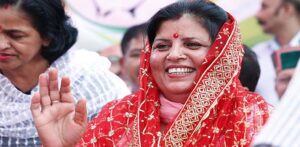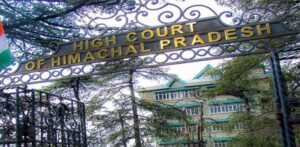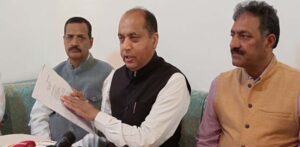Himachal elections: Model code of conduct and how it affects normal life

- Himachal CM’s wife may get ministry if Congress follows this tradition for cabinet expansion - November 5, 2024
- Himachal High Court maintains stay on termination of 900 horticulture project employees - November 5, 2024
- Himachal weather: After month of drought-like conditions, rain likely on this day - November 5, 2024
TNR Desk
As soon as the Election Commission announced the dates for the Lok Sabha elections and the Assembly byelections to six seats, the model code of conduct came into force in Himachal Pradesh and other parts of the country with immediate effect.
The EC has issued various instructions on observance of code of conduct from time to time. Important aspects of the code of conduct are below:
On welfare schemes, governmental projects:
1. The announcement of new projects, programmes, concessions, financial grants or any promises thereof, which may sway voters in favour of the ruling party, is strictly prohibited.
2. These restrictions are applicable to both new and ongoing schemes. However, it is important to note that for national, regional and state utility schemes that have reached the stage of completion, their utilisation or operation in the public interest should not be halted or delayed. The implementation of the model code of conduct cannot be cited as a reason for postponing the commissioning of such schemes or allowing them to remain inactive.
3. Nevertheless, it must be ensured that the commissioning of these schemes is carried out solely by civil authorities, devoid of involvement from political figures, and without any grand ceremonies. This is to prevent any perception or inference that the commissioning is aimed at swaying voters in favour of the ruling party.
4. Mere allocation of funds in the budget for a particular scheme, prior sanctioning of the scheme, or mention of the scheme in the Governor’s address or the Minister’s budget speech does not automatically authorise its announcement, inauguration, or initiation during the period when the model code of conduct is in effect. Such actions would be deemed as attempts to influence voters and would be considered a breach of the model code of conduct.
5. No new work shall commence if work orders were issued before the implementation of the model code of conduct but actual work has not commenced in the field. Such projects can only commence after the completion of the election process. However, if work has already commenced, it may continue uninterrupted.
6. There shall be no restriction on releasing payments for completed work(s) provided that the concerned officials are fully satisfied with the work.
7. The commission allows schemes addressing emergencies or unforeseen calamities like droughts, floods, pestilences and welfare measures for vulnerable groups. However, prior approval from the commission is required, and extravagant events must be avoided. It’s crucial to prevent any perception of using such measures for political gain as it could disadvantage other parties.
Transfers and posting of officials:
The Commission directs that there shall be a total ban on the transfer of all officers/officials connected with the conduct of the election. These include but are not restricted to:
1. The Chief Electoral Officer and Additional/Joint/Deputy Chief Electoral Officers
2. Divisional Commissioners
3. The District Election Officers, Returning Officers, Assistant Returning Officers and other Revenue Officers connected with the conduct of elections
4. Officers of the police department connected with the management of elections like range IGs and DIGs, Senior Superintendents of Police and Superintendents of Police, Sub-divisional level Police Officers like Deputy Superintendents of Police and other Police officers who are deputed to the commission under section 28A of the Representation of the People Act, 1951
5. Other officers drafted for election works like sector and zonal officers, transport cell, EVM cell, Poll material procurement & distribution cell, training cell, printing cell etc. Senior officers, who have a role in the management of election in the state, are also covered by this direction
6. The transfer orders issued in respect of the above categories of officers prior to the date of announcement but not implemented till the time when model code came into effect should not be given effect to without obtaining specific permission from the commission
7. This ban shall be effective till the completion of the election process
8. In those cases where transfer of an officer is considered necessary on account of administrative exigencies, the state government may, with full justification, approach the Commission for prior clearance
9. No appointments or promotions in government /public undertakings shall be made during this period, without prior clearance of the commission.
Misuse of official machinery:
1. Official vehicles, including those belonging to various government bodies and organisations, cannot be used for electioneering purposes. This includes vehicles from central and state governments, public undertakings, local bodies, and defence and police organisations.
2. Ministers may use private vehicles for personal visits, but not for election-related activities. Exceptions are made for urgent official duties, which must be certified and notified to the relevant authorities.
3. Ministers cannot summon election officers for official discussions during the election period, except in cases of emergencies like law and order issues or natural disasters.
4. Ministers may use official vehicles solely for commuting between their residence and office for official work, provided it’s not combined with electioneering.
5. Official tours of ministers cannot be combined with election-related activities.
6. Political functionaries are prohibited from using vehicles with beacon lights or sirens, even if they have a security detail.
7. Officials meeting ministers during their private visits to election constituencies can be subject to misconduct charges and statutory penalties under relevant laws.
Dos and don’ts for candidates, political parties
Do’s:
1. Ongoing programmes initiated before elections may continue
2. Relief efforts for areas affected by natural disasters can proceed
3. Grants for terminally ill individuals require appropriate approvals
4. Public spaces and helipads must be accessible to all parties for election purposes
5. Criticism should focus on policies and records, not personal attacks
6. Respect individuals’ right to a peaceful home life
7. Inform local police of meeting venues and times
8. Respect and adhere to any restrictive orders in place
9. Obtain permission for loudspeaker use at meetings
10. Seek police assistance for handling disruptions
11. Plan procession routes in advance and obtain necessary permissions
12. Comply with local restrictions and traffic regulations during processions
13. Ensure procession routes do not obstruct traffic
14. Support election officials for a smooth voting process
15. Workers must display badges or identity cards
16. Unofficial voter identity slips must be plain and devoid of any political symbols
17. Adhere to vehicle restrictions during campaigns and polling
18. Only authorised personnel may enter polling booths apart from voters and candidates
19. Report election-related complaints to designated authorities
20. Follow directives from the Election Commission and local election officials
21. Leave the constituency after the campaign period ends unless directly involved as a voter, candidate, or agent
Don’ts:
1. Government-funded advertisements promoting party achievements are prohibited
2. Ministers may not enter polling stations or counting centres unless as voters or candidates
3. Official duties should not mix with campaign activities
4. Offering inducements to voters, financial or otherwise, is prohibited
5. Appeals based on caste or communal sentiments are not allowed
6. Avoid activities that could incite communal tensions
7. Criticism should be focused on public activities, not personal lives
8. Avoid criticising other parties based on unverified claims
9. Religious places should not be used for election propaganda
10. Prohibited activities include bribery, intimidation, and canvassing near polling stations
11. Avoid demonstrations targeting individuals’ homes
12. Obtain permission before using private property for campaign materials
13. Do not disrupt other parties’ meetings or processions
14. Avoid holding processions near other parties’ events
15. Processionists must not carry items that could be used as weapons
16. Do not remove or deface posters from other parties
17. Do not display propaganda material near polling booths on election day
18. Use of loudspeakers is restricted to specific hours and requires permission
19. Avoid distributing liquor during elections
20. Security personnel with a threat assessment should not enter polling stations or move around with candidates
21. Individuals with security threats should not be appointed as election agents or polling agents




